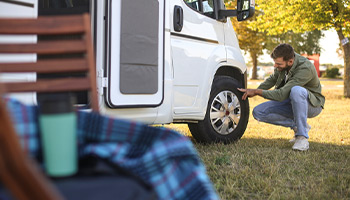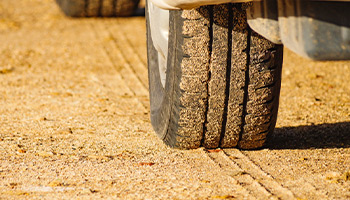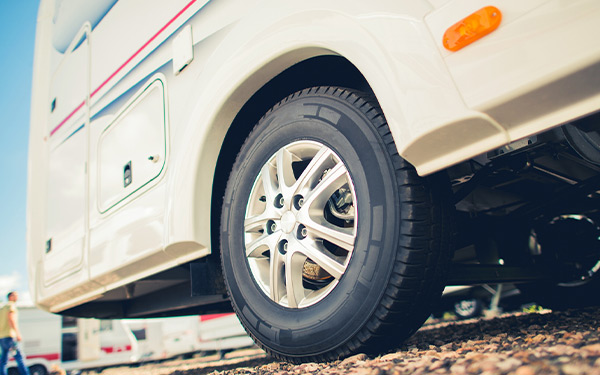If you’re like most adventurers, you’ve likely taken your RV on countless trips over the years. But, like any other vehicle, performing proper maintenance is key to ensuring your rig stays healthy. This is especially true when it comes to RV tires. After all, they’re the only thing between you and the road, and a tire blowout can be dangerous.
But how do you know when it’s time to replace your RV tires? Moreso, what kind of tires should you get for your rig? In this blog, we’ll answer these questions and more to help you understand some RV tire basics.
How Long Do RV Tires Last?

On average, most RV tires have a lifespan of around 3 to 6 years, or 10,000 to 20,000 miles. Yes, this is a pretty wide range, but that’s because multiple factors can influence your tires’ longevity, such as your average distance traveled, age and type of the tire, your RV’s weight, and even weather conditions.
It’s recommended to consider replacing tires after they hit the three-to-four-year mark. Although you may encounter travelers that have managed to make their tires last beyond six years, this is not always advisable as your chances of experiencing a blowout increase as your tires age. Plus, keeping your tires in good shape will help with fuel efficiency and the overall functionality of your rig.
How Do You Know When It’s Time to Replace RV Tires?
The most obvious way to know it’s time to replace your tires is when they’ve gone flat in storage and won’t pump up again. But what if you buy an RV and don’t know precisely when the tires were last changed? Typically, you can expect to see cracks and flaky rubber on the sidewalls of tires that are deteriorating. So if you notice any signs of excessive wear and tear, consider changing your tires before your next trip.

An easier way to get a quick gauge of your wheels is to check their age. Thankfully, all tires sold in the United States must have a Department of Transportation (DOT) code that will let you know when they were manufactured. The DOT code will begin with the letters “DOT” and end with a 3 or 4-digit number. The last two digits represent the year, and the first one or two let you know the week of the year. So, if your tire’s DOT code ends in “1021,” that means the tire was manufactured on the 10th week of 2021.
Another way to see if your tires need to be replaced is by checking their tread depth with a tire tread gauge. This tool goes between a tire’s grooves and measures the amount of tread left. It is advised not to operate an RV with treads below 2/32 of an inch. If your reading is below that, it’s time to purchase new tires.
You can also perform the penny test in a pinch if you don’t have a tire tread gauge. Place a penny upside down on the top of your tire between the treads. If you can easily see the top of Lincoln’s head, then you should purchase new wheels.
What to Consider When Purchasing New RV Tires
If you plan on replacing your RV’s wheels, you’ll first need to know the type of tire your RV needs. Not all RVs require the same kind of tires, so always refer to your owner’s manual to find your rig’s specific requirements. Two significant factors to consider when purchasing new tires are tire type and tire load rating. So, what are the different types of RV tires?
Special Trailer (ST) Tires
Special trailer (ST) tires are designed for vehicles with higher load limits. These tires have stronger sidewalls, allowing them to handle heavier loads and increase stability when towing. ST tires are common on travel trailers, fifth wheels, and toy haulers.
Light Truck (LT) Tires
As the name suggests, light truck tires are designed for light truck vehicles such as pickup vans, SUVs, and certain types of RVs. LT tires have a higher load rating compared to their passenger car equivalents. LT tires can be used on smaller-sized class B and C RVs.
Radial Tires
Radial (radial-ply) tires have a flexible sidewall construction that allows for improved shock absorption and longer tread life. Due to their construction, radial tires are more fuel efficient and less prone to overheating. Radial tires are best for those with larger rigs that use their RV frequently to go on longer trips. These tires are usually more expensive than most but are more durable.
Bias Tires

Bias (bias-ply) tires have a stiffer sidewall construction, allowing them to have better stability and load-carrying capacities at higher speeds. However, their stronger construction makes them less flexible, which usually causes them to have a shorter lifespan than other options. Nevertheless, RVers that tow large fifth wheels or toy haulers with heavy loads typically utilize bias tires, especially if traveling on rougher roads.
Don’t Forget About Tire Load Rating
You must consider a tire’s load rating when purchasing new RV tires. It’s no secret that RVs are large, heavy vehicles, so choosing a tire that can handle the weight you’ll be carrying is vital. If you purchase tires that aren’t rated for your RV’s size, not only will they wear out quickly, but you have a higher chance of experiencing a blowout.
Always refer to your owner’s manual to find the load rating your RV requires, especially if you didn’t purchase or install the current tires on your rig.
As a general rule of thumb, large class A motorhomes require tires that can support between 15k to 30k pounds. Class C motorhomes need tires that can support between 10k and 12k pounds. Lastly, class B motorhomes require tires that can support 6k to 10k pounds.
If you routinely carry large amounts of cargo, you must also factor that weight in.
Prioritize Your Safety
With RV tires, it’s better to be safe than sorry. If you suspect your tires need to be changed, doing so could help you avoid a major headache. Moreso, carrying specialized RV insurance could protect you financially in the case of a flat tire or blowout. For example, with RV roadside assistance, you’ll have access to critical aid should you find yourself stuck on the side of the road. And if your RV is damaged physically from a blowout, having RV collision and comprehensive coverage could help with the repair costs.
To learn more about the RV insurance coverages available, contact our RV insurance specialists today at (866) 501-7335 for a free quote.
The information in this article is obtained from various sources and is offered for educational purposes. Furthermore, it should not replace manuals or instructions provided by the manufacturer or the advice of a qualified professional. No warranty or appropriateness for a specific purpose is expressed or implied.
